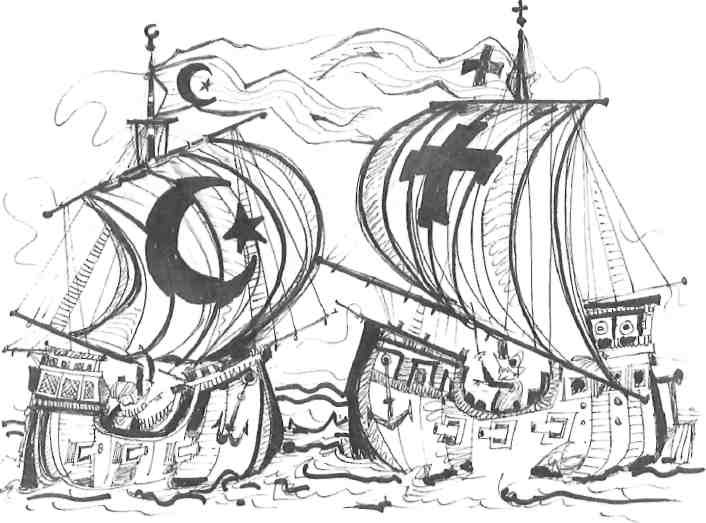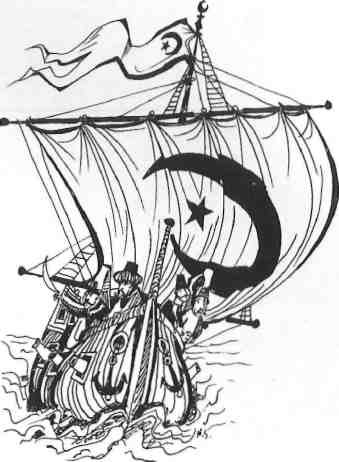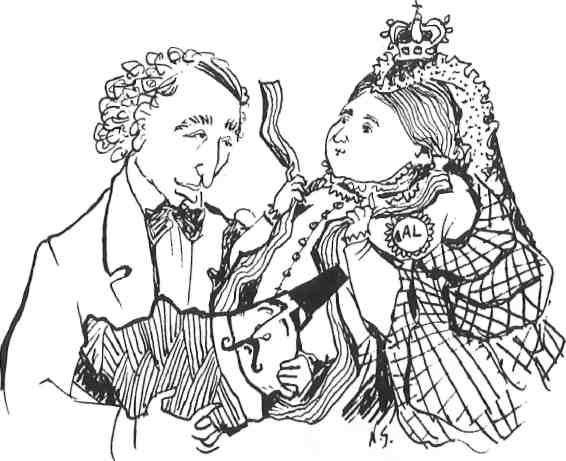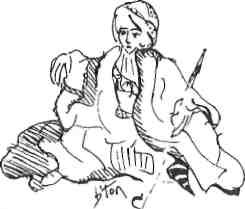PART II — THE FORSAKEN ISLAND
Illustrated by NIKOS STAVROULAKIS
The fall of Constantinople in 1453 had united the Ottoman Empire commercially as well as geographically to its Balkan conquests won in the previous seventy years. The Turks were primarily a continental people with little knowledge of the sea. A cut through the isthmus of Suez was begun in the 1570’s, but it was a half-hearted undertaking and was given up in a few years. In road construction, however, the Turks were masters, and their network of overland routes was the envy and admiration of Europe for two centuries to come.

In consequence, East-West trade began moving from Syria north through Anatolia, by-passing the maritime route on which the prosperity of Venice and the Kingdom of the Lusignans, the earlier rulers of Aphrodite’s island, so long depended. Cyprus, the easternmost island along this route, was the first to suffer. The once sweet land of Cyprus was no longer the rich and glittering prize of Crusader days.
Among the disasters that had been visited on the island in the reign of King Janus was an annual tribute demanded by the Mamelukes of Egypt. From that time on, Cyprus was anything but free. When Venice ‘inherited’ Cyprus fifty years later, she also inherited the paying of the tribute. In 1517 the Mamelukes were overthrown by the Ottomans and the tribute was then paid to the Sultan.
The impoverishment of Cyprus at the time of the Ottoman conquest was so advanced that it became a financial liability. In 1585, according to the careful estimate of Bernard Sagredo, the Sultan drew from the island a revenue of 208,000 ducats and paid out expenditures amounting to at least 276,000 ducats. Sagredo believed that had it been explained to the Turk when he was threatening to attack the island that the conquest would be a financial failure, he would have refrained and been content with receiving the payment tribute.
If Cyprus had hopes of a revival under Turkish domination, they were shattered at the Battle of Lepanto which took place less than ten weeks after the surrender of Famagusta to the Turks. Once again a great western victory was a disaster for the Levant. The destruction of the Turkish fleet not only discouraged further Turkish maritime adventures in the vacuum of naval power that it left in the Levant, it allowed for a resurgence of piracy unknown since the heyday of the Saracen corsairs seven hundred years earlier.
Islands when they are not stepping-stones are isolated indeed. The history of Turkish rule in Cyprus is, in the words of Sir Harry Luke, ‘a story of provincialism and decay, of contracting commerce and unenterprising administration, a story not regal but parochial… From being a Kingdom renowned throughout Christendom, the island had become an obscure Ottoman dependency.’
The Turkish conquest left Cyprus in a pitiable condition, but the claims of Italian chroniclers that from the start the Cypriots regretted Turkish rule and longed for the return of the Venetians is mere Western propaganda. The desolation and depopulation of the island was largely Venetian work as a glance at the census and fiscal reports of the time clearly shows.
Generally, the Greeks felt themselves partly compensated for the grievous state to which they were reduced by the fact that they were delivered of the Latin yoke. Those who had been serfs under Frankish rule now became owners of their houses and fields, with the right of succession to their heirs. This and the restoration of the Orthodox Archbishopric were two boons ‘far outweighing the drawbacks of oppressive taxation and the partial administration of justice’.
The problem of depopulation and its subsequent scourge, the increase of malaria, were met by sending Turkish settlers from Asia Minor. A contemporary document reveals, ‘a commandment has been given throughout Natolia that three households in every street shall go to people Cyprus, where there are few Turks and many Christians’. The appearance of Turks on the island as a result of this enforced resettlement, changed the real life of Cyprus more profoundly than four hundred years of Latin rule.
There is no fault to be found in the intentions of the Turkish government with respect to the treatment of the island. It had, it is true, a sharp eye to the extraction of a good revenue from the people, but it was aware that the only way to achieve this was to treat its subjects decently.
Alas, between the laws themselves and their administration yawned a breach which grew in time to be unbridgeable. At first there were attempts to correct abuses, but these came to little or nothing, and a century after the Turkish conquest the rapacity of the Pashas and the tax-gatherers was as great as it had been under the Venetians.
From the time of the establishment of the Turkish administration in Cyprus, the heads of the Christian churches were issued a grant which constituted them the civil leaders of their millet, or ethnos. As ethnarchs they became therefore official representatives of their people both in civil and ecclesiastical matters to the Sublime Porte. As such they were high dignitaries of the Ottoman State. In 1660, the Porte, in an attempt to curb the rapacity of its own officers, conceived the idea of recognising the Bishops not only as official guardians of their congregations, but also as the Empire’s representatives to the Orthodox population. In the seventeenth and eighteenth centuries the Bishops, and particularly the Orthodox Archbishop, became the chief instruments of imperial policy with power equalling and at times surpassing that of the Governor himself.
The identification of Church with State which so shocked the English on their arrival in the latter half of the nineteenth century and remained a concept to which they could never grow accustomed, was the prime administrative policy of the Turks and had been by then in existence for centuries. This procedure was carried out in all non-Islamic provinces of the Ottoman Empire but in Cyprus it was particularly strong, constituting a theocracy not unlike those of the priest-kings in ancient times.
It was inevitable that the civil power of the Orthodox priests would eventually corrupt them. Given the grinding poverty of the people and the impossible demands of the Porte, few who were bred in that ignorant, corrupt, half-literate and oppressed world could find the moral strength to preserve their integrity.
This was not a Church that could breed the superb sophistication of a Richelieu, a Mazarin or a Talleyrand let alone that easy Protestant piety that comes from leading a free and decent life. Rather it was a Church unacquainted with worldliness whose asceticism came from an intimate knowledge of the suffering and violence of life.
The distressing state to which the island had sunk is glimpsed in the life of Haji Abdul Baki Aga, a one-eyed, illiterate woodcutter who abandoned his craft for the more remunerative career of a volunteer irregular — in short, a medieval gangster.

After escaping to Antalya on the mainland and contriving, with the help of a notable’s odalisque, to get himself appointed governor, he returned to Cyprus to be appointed chief magistrate at Larnaca. When the dragoman there dismissed him for robbery, Baki took revenge by murdering him on Easter morning, 1750.
For 17 years we see no more of him until he re-emerges being imprisoned for ‘indescribable trickery, deceit, treachery, and the persecution of many people.’ Four years later, Baki was made head of the Treasury by the Governor of Cyprus — apparently to spite reluctant bribe-payers.
When the Governor was recalled and a new one appointed, Baki had the successor treated by a doctor whom he bribed. The Governor died and within-forty days his successor met the same fate.
Baki then persuaded the Porte to elevate him to the vacant post. His six years in office proved so odious that the Bishops fled to Constantinople to plead their case before the Grand Vizier. Fortunate to have come through the ensuing trial with his life, the irrepressible Baki placed bribes in the right quarters and re-emerged as Governor.
This time the island howled in unison and so great was the outcry that the Sultan himself heard it. He cancelled Baki Aga’s appointment, and sent him into virtual banishment as a customs officer at Jaffa, ‘a desert place, where,’ Archbishop Kyprianos recounts, ‘the Divine Will harkening to the groans of the whole people, he soon after was smitten with the plague, and spat out his life.’
Gone but by no means forgotten by the Cypriots, Baki had memorial cairns built to him at many crossroads. Each passer-by would add his stone — and a curse.
An official of the Tuscan Consulate, Giovanni Mariti, travelling in Cyprus in those days, happily gives us a somewhat different picture of the times.
‘The Cypriots’ he tells us,’ are generally well-formed, tall and good looking, sober and temperate. The women have mostly good eyes. They are tall, spirited, little industrious and luxurious: they are long-lived and often re-marry when they are already great-grandmothers. All Greeks like amusement, but the Cypriots to excess; and though they never be so oppressed by the government they never lose their liveliness.’
Luckily we have these eye-witnesses to remind the solemn historian that we are still on the island of Aphrodite.
The career of Baki Aga was exceptional but its evils were, for the most part, only an exaggeration of the abuses of the time. The Porte, with reason, preferred the management of the Orthodox Bishops. And so there rose up a faction among Turkish officials both in Cyprus and Constantinople which grew resentful and jealous of the Greeks.
The Greek War of Independence provided this faction with a motive and an excuse. Certainly there was no doubt where the sympathies of the Greek Cypriots lay, but few of them in fact volunteered when the summons to join the revolt was given, and it is highly unlikely that Orthodox Cypriots would ever have joined Greece in a struggle for liberty. Nonetheless, this was the accusation the the Governor of Cyprus, Kuchuk Mehmed, brought against the Bishops and the leading Greek laymen of the island. Receiving authority to proceed against them, he acted swiftly and ruthlessly.

Kuchuk Mehmed was commonly believed to be quite mad. The French Consul described him at the time as ‘a most ferocious and savage looking fellow, with none of the gentlemanly and dignified manner which generally characterize Turks of rank’. Kuchuk Mehmed summoned the leaders of the Greek community to Nicosia ‘to meet and give expression to their gratitude to the Sultan for his fatherly care of his subjects.’ Once they were assembled, he had the gates of the city shut. The massacre began.
The first victims were the three Bishops who were beheaded in the square of the Saray. Then the Archbishop, Kyprianos was hanged from a mulberry tree and his archdeacon from a plane-tree opposite. Three leading Chistian laymen were beheaded the same day. The next day the orgy of slaughter proceeded fast and furious. In all it lasted about a month. Trie exact number of victims is unknown, but it was probably about four hundred.
When the riot of blood was spent, Kuchuk Mehmet let loose his insane savagery on the island as a whole. Turkish and Greek villages were devastated indiscriminately. The property of the foreign consuls in Larnaca was confiscated and their houses looted. Some fled in fear of their lives.
The island fell into such a state of anarchy that the Sultan had to request Mehmet Ali to send in Egyptian troops to restore order. In the ten years following the massacre, trade declined to almost nothing, production was seriously reduced and an estimated 25,000 Cypriots escaped abroad to Trieste, Leghorn, Marseilles, but, for the most part, to Greece.
In the 1830’s the reforms of Sultans Mahmud II and Abdul-Medjid began to be felt in Cyprus. Tax-farming was abolished. The governorship was made by appointment, rather than by auction. Local courts, too, were set up. But it was too little and it was too late. In 1845 the British Consul, Niven Kerr, reported that the condition of the island was deplorable, that embezzlement knew no bounds and that Cyprus was considered the most oppressed of Ottoman dominions.
Yet it was in the middle of the dark night of its desolation that the Goddess of Love took pity on her foresaken island. Myth, riding high on the rather rusty wings of Old Romance, brought Cyprus her deliverer. But like most deliverers he at first passed unrecognized.
It would have been most fitting if in January 1830 the twenty-six year old Benjamin Disraeli had landed at Paphos from whose foams Aphrodite had risen. But as history is ill-fitting, he landed at Larnaca instead because that is where foreign ships were supposed to land. His head cluttered with the trappings of Walter Scott novels and his heart fired by Byromania, Disraeli on The Grand Tour was on his way to the Holy Land. Of his stop in Cyprus, he wrote back to his sister, ‘We passed a day on land famous in all ages… the rosy land of Venus, the romantic Kingdom of the Crusades.’

Seventeen years later Disraeli relived this romance of his youth in his novel, Tancred. It is a chaotic tale of satire and salvation.
As a practicing Christian intensely proud of his Jewish ancestry, Disraeli saw the two faiths as extensions of one another, both deeply rooted in what he called ‘the great Asian mystery.’ While he despised the Turks, he was strongly attracted to Arabia. ‘Arabs are only Jews on horseback,’ he once observed.
In Tancred the hero’s object is to conquer the world ‘with angels at our head, in order that we may establish the happiness of man by a divine domination, and, crushing political atheism that is now desolating existence.’ On the final page Eva, the Jewish heroine, appropriately faints when Tancred avows his love. In short, Disraeli saw a theocracy built on the power of love. Little wonder that he was attracted to Cyprus.
In another passage from the novel, published in 1847, Disraeli has this comment: ‘The English want Cyprus, and they will take it as compensation… The English will not do the business of the Turks for nothing.’
It has been suggested that Disraeli’s novels are really not novels at all, but political tracts. It might be better argued that Disraeli’s political acts were not really political at all, but novels. If the latter can be entertained, the Cyprus Convention is his literary masterpiece.
On June 13, 1878, the Congress of Berlin was convened in order to correct the ill effects of the Treaty of San Stefano. The latter had been signed three months earlier at the close of the fourth Russo-Turkish war of the century. The eyes of the world were turned towards Turkey’s European frontiers and Russia’s constant advance towards Constantinople. No one was giving a thought to Turkey in Asia, much less to Cyprus.

No one, that is to say, but the British Prime Minister, Disraeli, who was also the Senior British Plenipotentiary at the Congress, and the British Ambassador to Constantinople.
Before the Congress ended, its members and the world at large were astonished to learn that on June 4, nine days before the Congress had opened, a ‘Convention of Defensive Alliance’ had been signed in all secrecy between Great Britain and the Ottoman Empire. Under this Convention the Sultan undertook to assign the island of Cyprus ‘to be occupied and administered by England.’ The purpose was to enable Britain to support Turkey’s sagging power in the Middle East and to provide Britain with an Eastern Mediterranean stronghold along what was then called ‘the alternate route to India.’ Disraeli himself described Cyprus to Queen Victoria as the ‘key to Western Asia.’ The august statesmen in Berlin may have been amazed by the news of Disraeli’s ‘coup’, but Greek merchants had already gotten wind of it.
peculators from Constantinople had begun, some days earlier, to purchase all the large houses in Larnaca. When the time came they demanded fabulous rents and when the cry ‘the English have come!’ rose up in the streets of Nicosia, it was imperative that the statesmen in Berlin be notified.
The Russians were of course furious. The French, who were already interested in Syria, were much put out. To avoid offending French sensibilities, the British Foreign Minister indicated that France might have a free hand in Tunisia. ‘Do what you like there,’ were his precise words.
The Italians were bitter. However modest their intentions and powerless their position (they already had an eye on the Dodecanese which, indeed, they would one day acquire) they were haunted by the memory of those lost ladies, Catherine Cornaro and Charlotte of Savoy, awakening hopes long deferred. ‘The divine island,’ said the Bersagliere, ‘has been sold by the eunuchs of Constantinople to the usurers of London.’
Bismarck, however, was pleased. He approved of this indication that Britain, whose relinquishment of the Ionian Islands had seemed to him decadent, was making progress. ‘Progress to Bismarck,’ Disraeli remarked, ‘always means seizing something.’ Queen Victoria wrote to Disraeli in words worthy of Herodotus, ‘High and low are delighted, except Mr. Gladstone, who is frantic,’ Gladstone certainly was the British government’s most dangerous critic. That most splendid of Victorians, who was fluent in ancient Greek and the most refined of Hellenists, made the curious proposal that Cyprus should at once be handed over to Greece.
For all the talk later about the Cinderella Colony, the colony of Cyprus was in fact the love-child of Benjamin Disraeli and Queen Victoria. To the delight of them both, Gladstone was forced to play the role of ugly stepmother at its baptism. In an age devoted to piety and prostitution, the fine friendship between the Queen and Disraeli transmits to us a rare but refreshing portrait of passion.
The English no more understood Disraeli than they did Cyprus. To them he was always something of a maverick, something to be despised. In fact he lived in a far wider world, one in which islands were stepping stones — Cyprus and Britain both — and not merely insularities. He came too late for Cyprus and at the same time too soon. How the subsequent history of that island might have benefitted from his broader understanding!
On 22 July 1878 Sir Garnet Wolseley, arrived at Larnaca. The Queen’s commission was read and he swore himself in as High Commissioner and Commander-in-Chief. The general feeling of both Greeks and Turks appears to have been one of welcome for the new dispensation and hope for the future. The Bishop of Kitionread an address of welcome in the course of which he said, ‘We accept the change of Government inasmuch as we trust that Great Britain will help Cyprus to be united with Mother Greece.’
During the hoisting of the flag an incident took place which might have had serious consequences: ‘a Turkish officer, provoked by a Greek, drew his sword and would have cut him down had he not escaped into the crowd.’
Otherwise there were few incidents, but at heart the second British occupation of Cyprus was hardly better thought out than the first — Richard the Lion Heart’s nearly 700 years before. Three years after the cession of Cyprus to Great Britain, Wolseley was called to Egypt. The alternate route to India was forgotten, and Cyprus lost most of its strategic value. C.WJ. Orr states, semi-officially, that if Britain had acted then in self-interest, she would have returned Cyprus to the Ottoman Empire — if, and it was highly questionable, the Sultan would have accepted it back.
‘Apart from the loss of prestige which such a policy would have entailed,’ Orr goes on to say, ‘and the difficulty involved in the administration just planted in a country, there was undoubtedly a strong feeling against handing back to Turkey an island containing a population more than three-quarters of which belonged to the Christian faith.’
Britain from the first had problems, the most incessant of which was the Tribute inherited from King Janus in the early 15th century. This obligation however was only nominally to be paid to Turkey. It was actually payable to the British Treasury for the bondholders of the Turkish Guaranteed Loan of 1855, a loan which Turkey had never made good.
In 1907 Winston Churchill, following a visit to Cyprus, wrote:
‘We have no right whatever, except by force majeure to take a penny of the Cypriot tribute to relieve us from our own just obligations, however unfortunately contracted. There is scarcely any spectacle more detestable than the oppression of a small community by a great power for the purpose of pecuniary profit.’
Only in 1927 was the Turkish Debt discharged, and then on the condition that the colony would agree to contribute 10,000 pounds to Imperial Defence. On September 5 the Legislative Council expressed its thanks in the words, ‘the happy answer of the Imperial Government has fulfilled all Cypriot aspirations concerning this burden.’ So then and only then was the sad soul of King Janus discharged of a debt contracted 500 years earlier amid the neolithic ruins of Khirokitia.
For 35 years Cyprus remained in the curious position of being de facto but not de jure under the rule of Great Britain. This was clarified in 1914 when Britain and Turkey went to war and Cyprus was annexed.
Curiously, however, Lloyd George in 1912 actually suggested that Cyprus might be ceded to Greece in return for England’s being allowed to use Cephallonia as a base in case of war. Since in a Mediterranean war Greece would probably have been involved on England’s side, Venizelos accepted the proposal in principle. But Streit, the Foreign Minister then in London, objected that it would be ‘harnessing Greece to the British chariot.’ It was an understandable objection. The Queen of Greece was the sister of the Kaiser and the court was pro-German. So no decision was reached and the matter was dropped. In October 1915 another offer to join Cyprus to Greece was made. The condition was that Greece fulfill her obligations under the Greco-Serbian Treaty and give full and immediate support to Serbia. The Zaimis Cabinet was reluctant to do this and within a few days the offer lapsed.
It is well, then, to remember that in thirty year’s time Britain, Turkey, and Greece all expressed a reluctance to be in possession of Cyprus.

In 1923 by the Treaty of Lausanne, Turkey renounced the island of Cyprus. Two years later it became a British Crown Colony. The constitution that Gladstone had granted to Cyprus in 1882 was unaffected by these changes, even though Cyprus was said to have acquired a ‘toy parliament which was a great nuisance to the giver.’ In 1929 the British government officially pronounced ‘What Cyprus needs at present is fewer occasions for political discussion and more occasions for constructive work.’
In 1931 there was a riot in Nicosia and Government House was burned. The inflammable mid-Victorian military wooden bungalow that was Government House had been diverted from Ceylon to Cyprus in 1878 and was more loathed by its British occupants than by the Cypriots themselves. But this did not lessen the insult. From then on the word enosis took on a sinister meaning which was to darken over the years.
For years enosis had been thought of as a fact of life. Orr approved of it. In 1907 Churchill could say, ‘It is only natural that the Cypriot people of Greek descent should regard then-incorporation with what they call then-mother country as an ideal to be earnestly, devoutly, and fervently cherished. Such a feeling is an example of the patriotic devotion which so nobly characterizes the Greek nation.’
But in the 1930’s, such talk was dismissed as a ‘farrago of impossible nonsense!’ It was not so much that familiarity breeds contempt, as that the pride of two peoples forcing one another to extremes breeds misunderstanding.
That the island of the Anglican Church should have in certain matters misconstrued the island of Aphrodite is scarcely to be wondered at. In the one, oppression had made of religion a deep, historical necessity. In the other, liberty had allowed the roots of religion to grow and flower into moral grandeur.
One thing is indisputable: in eighty years of governance, the British, whether they wished it or not, encouraged and nourished enosis. They believed that prosperity within the Empire would dampen down this nationalist movement. It did just the opposite. It always does among an intelligent people. Under great and long oppression people become dazed and apathetic. When one is dying of hunger, one looks for food before one looks for liberty. Under the British, the Cypriots found food and, so nourished, began to look for liberty as well. The earlier revolts against the Turks were merely the reactions of animal desperation.
The coming of the British gave the Cypriots hope. In this sense all of Britain’s colonies were Cinderellas, and if its Empire ever committed a sin in the face of humanity, it was to make them think that they were all princesses. The Empire ended in a total contradiction, and the politics of Victorian possession became the instruments of liberty.
For years the British complained of Greek – Cypriot ingratitude. They brought forth reams of paper to prove what prosperity had brought to the people of Cyprus. Trade thrived, exports increased, the population tripled (oh, divine island of Aphrodite!). Why, then, enosis? For precisely that reason. That the most serious Greek disturbances before the war should have occurred during the governorship of Sir Ronald Storrs, who was the most sympathetic of Hellenists, today can only be seen as inevitable.
Even so the situation darkened. The Greek Cypriots retreated into intransigence, the British into self-righteousness. In the meantime the resurgence of Turkey under Ataturk made itself felt, and championed the cause of no small majority.
THE solution in 1960 was independence. But is it a lasting solution? Have the citizens of both communities the courage to support it? Have the mother countries of both communities the patience and the integrity to maintain it? Will the super-powers today in their grand designs ‘delegate’ such minor matters to gangsters or to competent men?
These are questions in which history and myth have, as yet, no part. For the moment they are current affairs — matters of life and, all too frequently, death. In time they will have their say. History, let us hope, will record these things fairly and with truth so that the future will learn of them well.
As for myth, let us hope that it will bridge a distant past with some unforeseeable future, and that when the records are lost myth will tell some simple but significant story.







